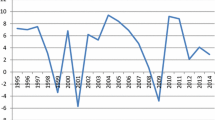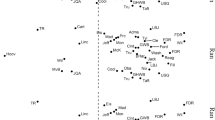Abstract
This paper is an empirical study to the effects of economic outcomes on party choice for the Netherlands. In the first part of the paper we employ a multinomial logit model to examine the links between voters' characteristics and party choice. The results suggest that there are long-run movements in party choice which are unlikely be the result of changing economic outcomes. In the second part, we use time series analysis to determine the effects of economic conditions on short-run and medium-run movements in votes shares. The estimations results provide support for the responsibility hypothesis and for the predictions of the partisan voter model that left-wing (right-wing) parties benefit (suffer) from favourable economic growth prospects.
Similar content being viewed by others
References
Anderson, C.J. (1995). The dynamics of public support for coalition governments. Comparative Political Studies 28: 350–383.
Balke, N.S. (1991). Partisanship theory, macroeconomic outcomes, and endogenous elections. Southern Economic Journal 57: 920–935.
Chappell, H.W. and Keech, W.R. (1985). A new view of political accountability for economic performance. American Political Science Review 79: 10–27.
Dalen, H.P. van and Swank, O.H. (1996). Government spending cycles: Ideological or opportunistic? Public Choice 89: 183–200.
Eijk, C. van der and Niemöller, B. (1983). Electoral change in the Netherlands. Dissertation, University of Amsterdam, CT-press, Amsterdam.
Eisinga R. And Felling, A. (1992). Confessional and electoral Alignments in the Netherlands, 1962–1991. Amsterdam: Steinmetz Archive.
Grilli, V., Masciandaro, D. and Tabellini, G. (1991). Political and monetary institutions and public financial policies in the industrial countries. Economic Policy 13: 342–392.
Hibbs, D.A. (1977). Political parties and macroeconomic policy. American Political Science Review 71: 1467–1487.
Kramer, G.H. (1971). Short-term fluctuations in U.S. voting behavior, 1896–1964. American Political Science Review 65: 131–143.
Mueller, J.E. (1970). Presidential popularity from Truman to Johnson. American Political Science Review 64: 18–23.
Mueller, D.C. (1989) Public Choice II, Cambridge: Cambridge University Press.
Nannestad, P, and Paldam, M. (1994). The VP-function: A survey of the literature on vote and popularity functions after 25 years. Public Choice 79: 213–245.
Renaud, P.S.A. and Van Winden, F.A.A.M. (1987). Political accountability for price stability and unemployment in a multi-party system with coalition governments. Public Choice 53: 181–186.
Rogoff, K. and Sibert, A. (1988). Elections and macroeconomic policy cycles. Review of Economic Studies 55: 1–16.
Schram, A.J.H.C. (1991). Voter Behavior in Economic Perspective. Berlin: Springer-Verlag.
Swank, O.H. (1995). Rational voters in a partisanship model. Social Choice and Welfare 12: 13–27.
Swank, O.H. (1998). Partisan policies, macroeconomic performance, and political support. Journal of Macroeconomics 20: 367–386.
Author information
Authors and Affiliations
Rights and permissions
About this article
Cite this article
Swank, O., Eisinga, R. Economic Outcomes and Voting Behaviour in a Multi-Party System: An Application to the Netherlands. Public Choice 101, 195–213 (1999). https://doi.org/10.1023/A:1018393902890
Issue Date:
DOI: https://doi.org/10.1023/A:1018393902890




